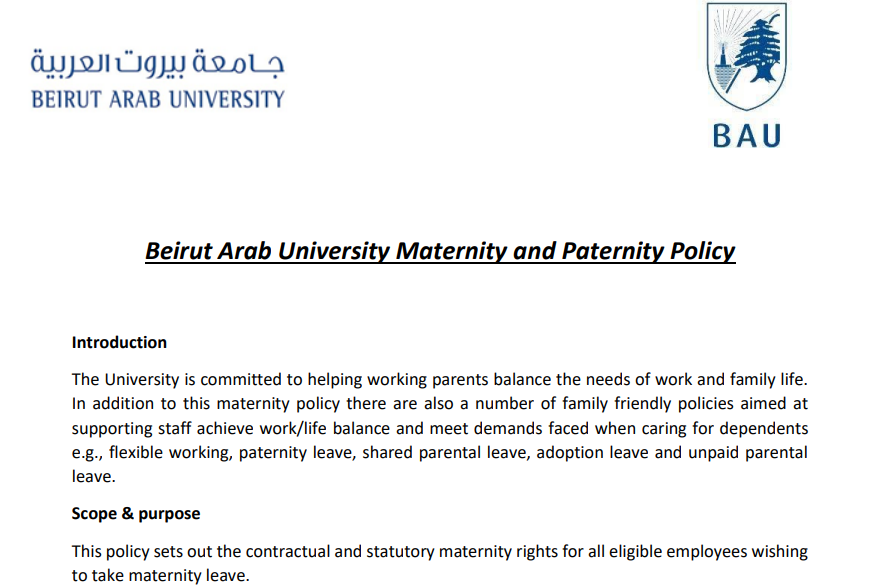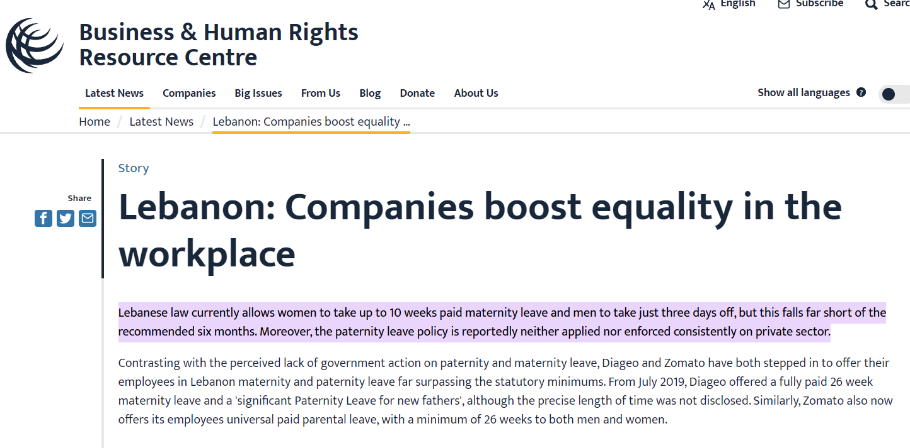Maternity and paternity policies
BAU is characterized by being a solidarity university with the academic community and its staff, taking this into account, it developed a Maternity and Paternity policy to support its employees in the process of being parents, always respecting their rights and for the welfare of the people who take an active part in work at the university.
BAU Maternity and Paternity Policy - Introduction
The University is committed to helping working parents balance the needs of work and family life. In addition to this maternity policy there are also a number of family friendly policies aimed at supporting staff achieve work/life balance and meet demands faced when caring for dependents e.g., flexible working, paternity leave, shared parental leave, adoption leave and unpaid parental leave [1].
BAU Maternity and Paternity Policy - Scope & purpose
This policy sets out the contractual and statutory maternity rights for all eligible employees wishing to take maternity leave.
Paternity and Maternity leave
The staff member must be taking time off to look after the child and be one of the following:
• The partner of the person who will give birth
• The partner of the primary adopter*
• The intended parent (if you are having a baby through surrogacy arrangement) *
The staff member must also:
• Have or expect to have responsibility for the child’s upbringing; and
• Have worked continuously for BAU for 26 weeks ending with the 15th week before the baby is due or, in the case of adoption and fostering to adopt, for 26 weeks as at the end of the week in which the adopter/prospective adopter is notified of being matched with the child.
*In the case of couples who are adopting a child or having a child through a surrogacy arrangement, adoption leave and pay are available to only one member of the couple. The other person can take Paternity and Maternity leave.
BAU Maternity and Paternity Policy - Eligibility
Employees who meet the above eligibility criteria can choose to take either one week or two consecutive weeks of Paternity and Maternity leave. Paternity and Maternity leave must be taken in a single block and cannot be taken as odd days or as two separate weeks.
During Paternity and Maternity leave, eligible employees will be paid by BAU at their normal rate of pay. (This will include an element of Statutory Paternity and Maternity Pay (SPP) where appropriate, which is effectively enhanced by BAU to equal full pay).
Employees can take only one period of leave per pregnancy even if more than one baby is born as the result of the same pregnancy.
• Female employees are entitled to 60 consecutive calendar days as Maternity Leave, provided that a medical certificate attested by the health authorities concerned clearly states the expected date of confinement. Such leave may include the period before or after confinement.
• Female employees may also avail an additional leave without pay for fifteen calendar days after the completion of their maternity leave.
• Following childbirth, female employees are entitled to two hours off-duty per day as a feeding period. The feeding hours may be taken in two intervals of an hour each, for a total period of 6 months.
• Female employees are also entitled to two periods of care per day for 30 minutes each until the child completes one year of age. Female employees have the right to combine these two periods for a total of one hour.
• The above maternity and feeding hour benefits must be coordinated with the respective Director, College Dean/Chairperson to avoid interruption of normal duties.
BAU Maternity and Paternity Policy - Entitlements
Employees who meet the above eligibility criteria can choose to take either one week or two consecutive weeks of Paternity and Maternity leave. Paternity and Maternity leave must be taken in a single block and cannot be taken as odd days or as two separate weeks.
During Paternity and Maternity leave, eligible employees will be paid by BAU at their normal rate of pay. (This will include an element of Statutory Paternity and Maternity Pay (SPP) where appropriate, which is effectively enhanced by BAU to equal full pay).
Employees can take only one period of leave per pregnancy even if more than one baby is born as the result of the same pregnancy.
• Female employees are entitled to 60 consecutive calendar days as Maternity Leave, provided that a medical certificate attested by the health authorities concerned clearly states the expected date of confinement. Such leave may include the period before or after confinement.
• Female employees may also avail an additional leave without pay for fifteen calendar days after the completion of their maternity leave.
• Following childbirth, female employees are entitled to two hours off-duty per day as a feeding period. The feeding hours may be taken in two intervals of an hour each, for a total period of 6 months.
• Female employees are also entitled to two periods of care per day for 30 minutes each until the child completes one year of age. Female employees have the right to combine these two periods for a total of one hour.
• The above maternity and feeding hour benefits must be coordinated with the respective Director, College Dean/Chairperson to avoid interruption of normal duties.
BAU Maternity and Paternity Policy - Employees can choose to start their Paternity and Maternity Leave on any day of the week either:
• From the date of the child’s birth or placement (whether this is earlier or later than expected).
• From a chosen number of days or weeks after the date of birth/placement (whether this is earlier or later than expected).
• From a chosen date after the expected date of birth/placement.
BAU Maternity and Paternity Policy - Paternity and Maternity Leave must be completed:
• Within 60 days of the actual date of the birth/placement
• if the child is born early, within the period of the actual date of birth up to 60 days after the expected week of birth
BAU Maternity and Paternity Policy - Parental Leave
Employees with at least one year's continuous employment have the right to take up to four weeks per year of unpaid 'parental leave' for each child under the age of 18, up to an overall total of 18 weeks' unpaid parental leave per child.
BAU Maternity and Paternity Policy - Notification process
Employees should discuss their intention to take Paternity and Maternity leave with their line manager as early as possible so that early consideration can be given to covering work during their absence.
To qualify for Paternity and Maternity leave, employees must formally tell BAU they wish to take Paternity and Maternity leave by completing the Paternity and Maternity Leave Form (Office document, 78kB), submitting it HR and sending a copy to their line manager inside the statutory time limit which is:
• In the case of births, including surrogate births, by the end of the 15th week before the baby is due
• In the case of adoptions or dual approved prospective adoptions, within 7 days of being matched with the child.
Employees can change the date they want their Paternity and Maternity Leave to start providing they give their line manager at least 28 days’ notice (unless this is not reasonably practicable).
Beirut Arab University adheres to the Statutes and Laws of Lebanon.
Lebanese law currently allows women to take up to 10 weeks paid maternity leave and men to take just three days off, but this falls far short of the recommended six months. Moreover, the paternity leave policy is reportedly neither applied nor enforced consistently on private sector.
Contrasting with the perceived lack of government action on paternity and maternity leave, Diageo and Zomato have both stepped in to offer their employees in Lebanon maternity and paternity leave far surpassing the statutory minimums. From July 2019, Diageo offered a fully paid 26-week maternity leave and a 'significant Paternity Leave for new fathers', although the precise length of time was not disclosed. Similarly, Zomato also now offers its employees universal paid parental leave, with a minimum of 26 weeks to both men and women.



